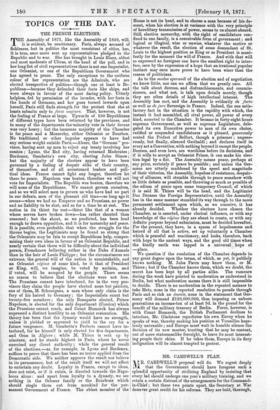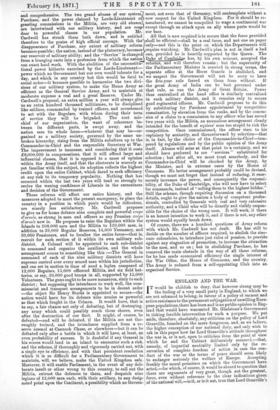MR. CARDWELL'S PLAN.
A R. CARDWELL'S proposal will do. We regret deeply 111. that the Government should have foregone such a splendid opportunity of civilizing England by insisting that every lad should undergo one year's military training, and we retain a certain distrust of the arrangements for the Command- in-Chief ; but those two points apart, the Secretary at War deserves great credit for his reforms. They are bold, thorough, and comprehensive. The two grand abuses of our system, Purchase, and the power claimed by Lords-Lieutenant o granting commissions in the Militia, are very old abuses, are intertwined with our military history, and are ye dear to powerful classes in oar population. Mr. Cardwell has struck them both down, and is entitled therefore to the praise of high official courage. With th disappearance of Purchase, any extent of military reform becomes possible; the nation, instead of the plutocracy, becomes our reservoir of military ability; and the "Service" is change from a lounging caste into a profession from which the nation can exact hard work. With the abolition of the unconstitu- tional power hitherto exercised by the Lords-Lieutenant- power which no Government but our own would tolerate for a day, and which in any country but this would be fatal to social order—it becomes possible to harmonize the two divi- sions of our military system, to make the Home Army as efficient as the General Service Army, and to maintain at moderate expense a real and a great Reserve. Under Mr. Cardwell's proposal, an extra million a year will always give us an extra hundred thousand militiamen, to be disciplined like soldiers, commanded by trained officers, and accustomed to act with the Regulars, with whom during their term of service they will be brigaded. The root mis- chief of our organization, the want of coherence be- tween its different parts, is swept away, and the nation sees its whole force—whatever that may be—or- ganized as a military society, governed by the same un- broken hierarchy, rising from the Militia subaltern up to the Commander-in-Chief and the responsible Secretary at War. The improvement is immense, and considering that it costs £8,000,000 in compensations, that it will offend large and influential classes, that it is opposed to a mass of opinion within the Army itself, and that the electorate is scarcely as yet familiar with the subject, its adoption reflects the highest credit upon the entire Cabinet, which dared to seek efficiency at any risk to its temporary popularity. Nothing that has occurred within the last two years will tend so strongly to revive the waning confidence of Liberals in the earnestness and decision of the Government.
These reforms will affect our entire history, and the measures adopted to meet the present emergency, to place the country in a position in which panic would be ridiculous, are scarely less satisfactory. Mr. Cardwell proposes to give us for home defence nine complete and powerful corps d'armle, as strong in men and officers as any Prussian corps d'aringe now is. He proposes to raise the Regulars within the Islands to 108,000 men and the Militia to 139,000 men, in addition to 39,000 Regular Reserves, 14,000 Yeomanry, and 30,000 Pensioners, and to localize the entire force—that is, recruit for each section of it within its own military sub- district. A Colonel will be appointed to each sub-district to command and organize the auxiliaries, and the whole arrangement comes to something like this :—The General in command of each of the nine military districts will have supreme control over every armed man within his jurisdiction, and can set in motion in time of need a legion composed of
12,000 Regulars, 15,000 officered Militia, and six field bat- teries, or say, 30,000 good troops in all, supported by 15,000 Volunteers. The guns ought to be more numerous, sixty to each district ; but supposing the intendance to work well, the com- missariat and transport arrangements to be in decent order —the object Sir Henry Storks is appointed to secure—the
nation would have for its defence nine armies as powerful as that which fought in the Crimea. It would have, that is to say, a fair chance not only of defeating, but of destroying,
any army which could possibly reach these shores, even after the destruction of our fleet. It might, of course, be defeated—and will be defeated, if the Militia are not tho- roughly trained, and the intendance supplied from a re- serve arsenal at Cannock Chase, or elsewhere—but it can be defeated only after a battle in which it will have, at least, an
even probability of success. It is doubtful if any General in his senses would land in an island to encounter such a risk,
and the scheme, if thoroughly and vigorously carried out, with a single eye to efficiency, and with that persistent resolution which it is so difficult for a Parliamentary Government to maintain, will, we believe, make the United Kingdom safe. Moreover, it will enable Parliament, in the event of any deli- berate insult or other wrong to this country, to call out the Militia, entrust the defences to them, and despatch nine legions of 12,000 men each, with their artillery, to any desig- nated point upon the Continent, a possibility which no Govern- ment, not even that of Germany, will contemplate without a naw respect for the United Kingdom. For it should be re-
membered, we cannot be compelled to wage a continental war except through an attack upon an ally whose ports would be our base.
All that is now required is to secure that the force provided shall be efficient—shall be a real force, and not one on paper only—and this is the point on which the Departments will require -watching. Mr. Cardwell's plan is not in itself a bad one, provided he is heartily supported by the Queen. The
Duke of CamJadaga has, by his own account, accepted the reforms, and will therefore remain ; but the superiority of the Parliamentary Minister is asserted in strong terms, the separate office at the Horse Guards is abolished, and we suspect the Government will not be sorry to have the five-year rule forced on them from without. If the great Army of India can be best governed under that rule, so can the Army of Great Britain. Power thus centralized at the head office is similarly centralized in each military district, and it remains only to secure good regimental officers. Mr. Cardwell proposes to do this by substituting for Purchase appointment by competitive examination, by elevation from the ranks, and by the conces- sion of a claim to a commission to any officer who has served two years with the Militia, an anomalous arrangement clearly intended for the benefit of squires' sons too stupid to risk the competition. Once commissioned, the officer rises to his captaincy by seniority, and thenceforward by selection—that is, in fact, by the choice of the Commander-in-Chief—tem- pered by regulations and by the public opinion of the Army itself. Abuses will arise at that point to a certainty, and we should have preferred to see "services " substituted for selection ; but after all, we must trust somebody, and the Commander-in-Chief will be checked by the Army, by the Minister, and in extreme cases by the House of Commons. No better arrangement probably could be devised, though we must not forget that instead of reducing, it enor- mously increases the power, and consequently the responsi- bility, of the Duke of Cambridge, who will now have to select for commands, instead of " selling them to the highest bidder." Still the scheme, though requiring discussion on a thousand details, ought to give the nation a body of competent profes- sionals, controlled by Generals with real and very extensive authority, and a Chief who will be directly and visibly respon- sible for the choice of the wrong man. It will work, if there is an honest intention to work it, and if there is not, any other system would equally break down.
Of course, there are a hundred questions of Army reform with which Mr. Cardwell has not dealt. He has still to decide on the number of officers required, to abolish the sine- cure colonelcies, to introduce just rules of pension, to provide- against any stagnation of promotion, to increase the attraction to the men, and so on ; but in abolishing Purchase, he has removed the main obstacle in the way of all these reforms, for he has made economical efficiency the single interest of the War Office, the House of Commons, and the country. The Army is reduced from a self-appointing Club into an. organized Service.



































 Previous page
Previous page